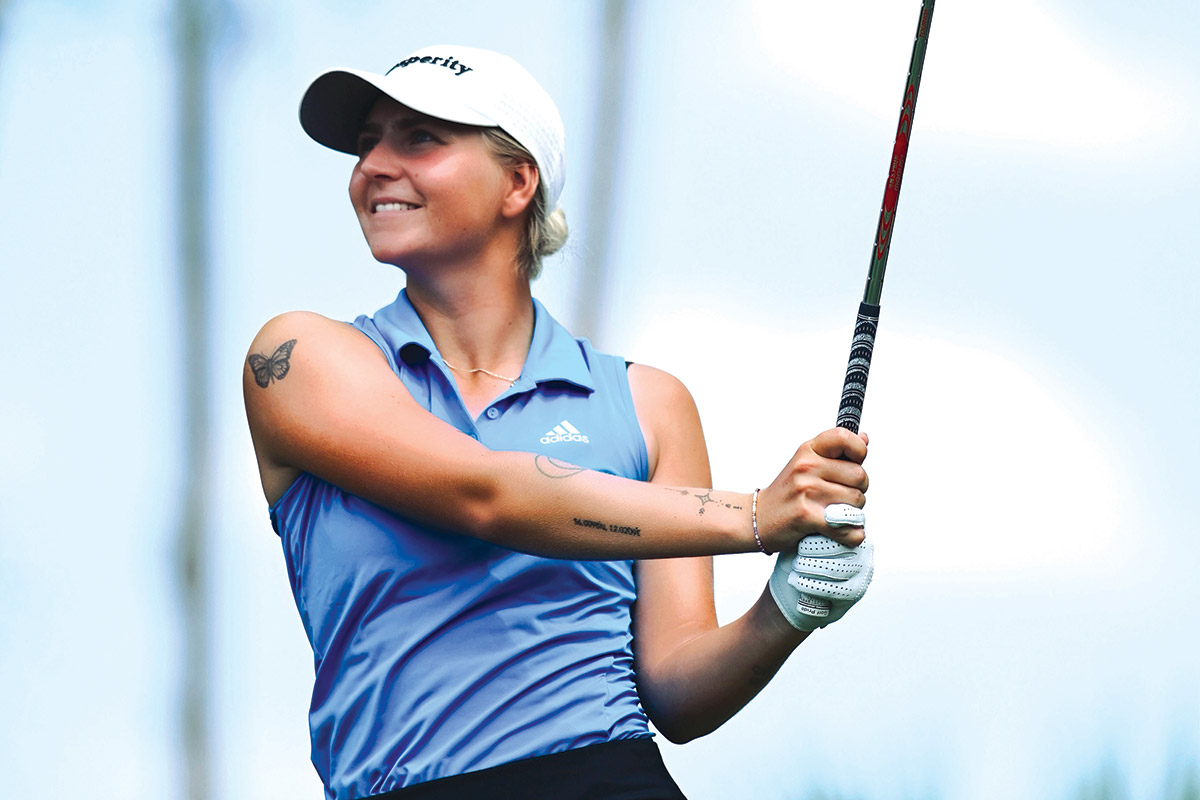
ou dream about playing the TOUR and you dream about what playing the TOUR is like, but you don’t know,” says Jim Furyk, 17-time PGA TOUR winner and the only professional golfer to shoot 58 in competition. Furyk said that when he first joined the TOUR in 1994, he had no idea what would be expected of him in terms of the business side of life—and being a professional golfer does, in many ways, mean that you’re starting a business.
Along with needing a home base, which often means rent or a mortgage and utilities, pros need a place to practice; they need to eat; there might be coaching staff and physical trainers; a vehicle; equipment costs (in the early days, at least); and other “life” expenses—and that’s before they join a tour. Once they’re playing, there are entry fees to pay; caddie salaries; flights; hotels; rental cars and all of the rest of it. For veterans juggling families and full schedules that include golf events, non-golf event appearances, multiple endorsement deals, sponsors and ancillary businesses, it can mean working with a wide and trusted network of agents and advisors. For younger or newer pro golfers the challenges might not be as complicated, but they can be just as daunting, as University of Houston standout Karen Fredgaard found when she joined the Symetra Tour this year.
“In college you’re used to just showing up on time, everything is taken care of for you,” she says. “You do the practice and play the golf they tell you to play.”

On tour, however, she says things are quite different, and slightly complicated by the fact that she’s from Denmark, meaning there were additional issues to sort out.
“Things certainly didn’t change overnight” after going pro, she says. “It was a long process of getting the visa status and setting up your own business accounts, focusing on all of the other things like travel and booking hotels and planning your trips and all of that.”
And there’s more to it than just renting a car, she points out, explaining that if locations for tournaments and other commitments are all over the place, there can be some serious decision-making involved, especially on a rookie’s budget.
“It can be like ok, I’m trying to figure out these first five tournaments. Do I like to drive if it’s a far drive? Do I like to fly? What makes more sense? And then how and when do you plan your practice around all of these things? Some of it comes kind of easily because I’m good at budgeting and stuff like that, and booking flights and hotels, but all of the money and responsibility and organizing the bigger questions, my dad helps me out; he checks through it and will be like, ‘Don’t book a five-star hotel!’”
Former SMU golfer Mac Meissner joined the Korn Ferry Tour last year, after graduating with a finance degree, and says that the challenges of pro life haven’t been as daunting as they might have been, thanks to a solid foundation provided by his parents.
“My mom was a teacher, so she instilled that work ethic in me, making sure school was of the upmost importance to me and that golf was second,” he says. “I had the time management skills, good study habits, and when I got to college that kind of translated and I was able to manage both academics and golf really well—and also to have some social life as well—and that’s helped now as well.”
The Byron Nelson award-winner took a slightly different tack in that he almost immediately began working with an agent, something Furyk did as well. Meissner also had some notion of what he’d be facing as his uncle Todd Haney played professional baseball and his brother, Mitchell, a former Rice golfer, is on the PGA TOUR Latinoamerica.
“I always knew I wanted to turn pro, and my brother graduated college and plays pro golf, so I knew a little about what it was going to be like, what I was getting into,” Meissner says. “I had enough success in college that
I’d spent time with an agency, and having my agent now being able to help me with the travel part—I would be lost without him.
“In college you’ve got people helping out, booking your travel and doing all this stuff, handling where you’re going to live and so on. Now, booking flights and travel and rental cars and hotels and then obviously balancing corporate days with my sponsors, being able to schedule all of that, it would be really difficult for me without the help of my agent and my mom and dad. I would have been pretty frustrated with the business side of it if it wasn’t for them. And now I keep my own expenses. I’ve got a spreadsheet that I update every two or three weeks just to make sure I keep track of the accounting side of things. A lot of people don’t know what goes on behind the scenes; it can be complicated.”
It doesn’t get easier, Furyk says.

“As I’ve gotten older, you start a family, maybe have other businesses outside of golf, those things start to become part of your life and I guess you have to deal with time management more. It can be fun in one sense, but if you don’t do it the right way it can take away from your career as well. I’m happiest when I’m playing my best, and so playing my best always has been first and foremost. But priorities can change as you get older, and getting married and having children, being a father and a husband, that all comes first—but outside of family I haven’t ever really put anything above golf.”
Furyk has had the same agent essentially since he turned pro—“not many people can say they’re still with the same agent,” he correctly points out—and says that choosing your team wisely can be key to success.
That includes choosing your agents, coaches and trainers, but it also includes aligning with your sponsors. In this regard it’s interesting that all three—the veteran Furyk and the two newcomers, Fredgaard and Meissner—share an affiliation in Insperity, the leading HR solutions company behind the long-standing PGA TOUR Champions event, The Insperity Invitational.
“I get asked that a lot about the corporate relationships I’ve had,” Furyk says. “Why does it make sense for you? With Insperity, for example, they’re the title sponsor of a PGA TOUR Champions event that raises a lot of money for people. Two, as a player I think you’re looking for successful companies, folks that are at the top in their category. And three, when you do a deeper dive about the company, what they do with their golf tournament in raising money, but also their other interests in the community, their employees are very active in charitable work, and when I look at what they’re interested in, it’s the same interests as my wife and I with the Jim & Tabitha Furyk Foundation.”
Meissner credits Insperity’s values as attractive to him as well.
“Being business-minded it aligned really well for
me,” Meissner says. “And one of their most important values is integrity, and with golf it’s probably one of the most important things out here. Integrity is really important to me.”
And Fredgaard likewise says the character of the company means a lot to her.
“Insperity’s values and my values are pretty much the same; we both care about helping other people, about working hard and having a lot of integrity. I’m super blessed that they are able to help me play on the tour and reach my goals and try to go out for my dreams of winning majors and playing on the LPGA. They’re a huge help and part of this new life that I’m building.”
At the end of the day, as Furyk says, being a professional golfer takes a team and careful planning.
“My main concern as a young player was playing well,” he says, “and everything off course I tried to simplify: hire an agent you trust, work with good people. What it brought to my career, what it did for my career was imperative. I think I’ve always been able to focus on golf. It’s what I love and enjoy, and I’ve never really gotten sidetracked too much by outside businesses. I still, even at 52, really enjoy competing and playing, and it’s what I’m best equipped to do. I’ve always tried to keep it so that nothing from a business perspective outside of golf has gotten in the way or hindered me from playing my best. If I’ve not played well, it hasn’t been due to the business side. I don’t have that excuse.”
Follow Us On


| Cookie | Duration | Description |
|---|---|---|
| cookielawinfo-checkbox-analytics | 11 months | This cookie is set by GDPR Cookie Consent plugin. The cookie is used to store the user consent for the cookies in the category "Analytics". |
| cookielawinfo-checkbox-functional | 11 months | The cookie is set by GDPR cookie consent to record the user consent for the cookies in the category "Functional". |
| cookielawinfo-checkbox-necessary | 11 months | This cookie is set by GDPR Cookie Consent plugin. The cookies is used to store the user consent for the cookies in the category "Necessary". |
| cookielawinfo-checkbox-others | 11 months | This cookie is set by GDPR Cookie Consent plugin. The cookie is used to store the user consent for the cookies in the category "Other. |
| cookielawinfo-checkbox-performance | 11 months | This cookie is set by GDPR Cookie Consent plugin. The cookie is used to store the user consent for the cookies in the category "Performance". |
| viewed_cookie_policy | 11 months | The cookie is set by the GDPR Cookie Consent plugin and is used to store whether or not user has consented to the use of cookies. It does not store any personal data. |